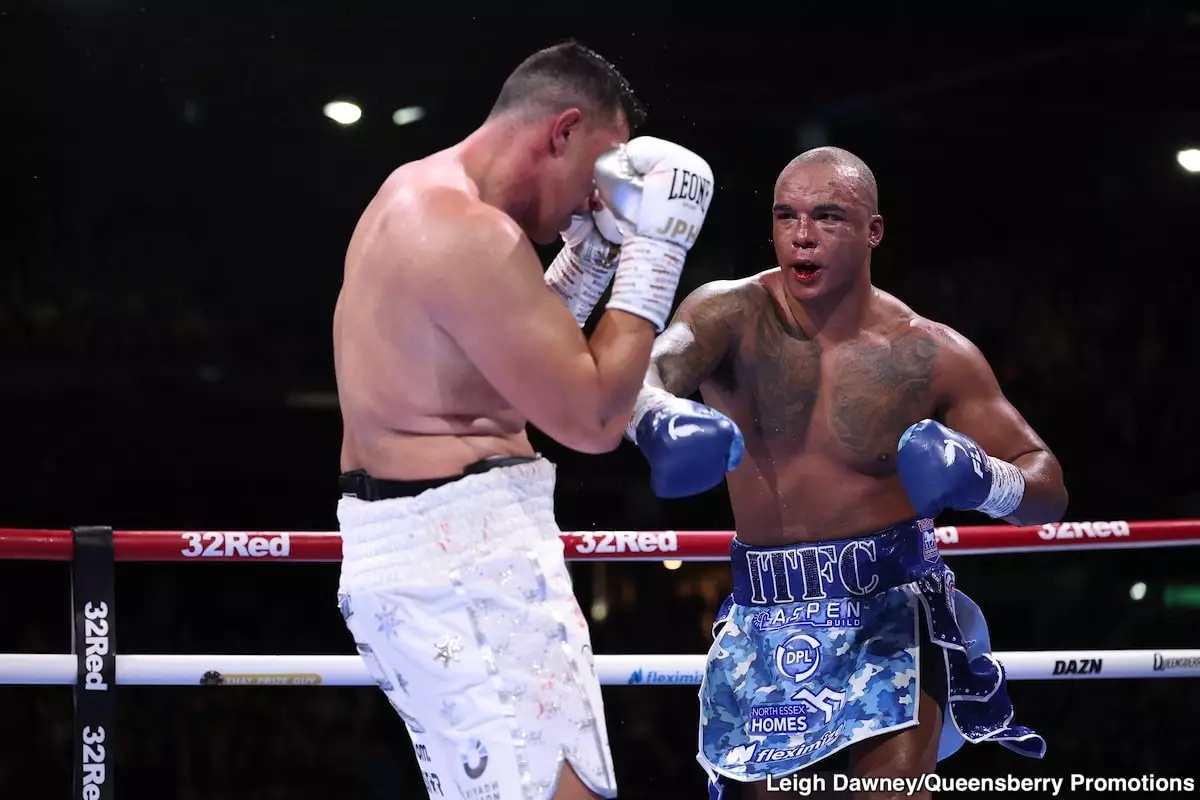In the fierce world of professional boxing, a single moment can redefine the trajectory of not just a match, but an entire career. This was precisely the case during the highly anticipated clash between British heavyweight Fabio Wardley and Australian contender Justis Huni. It was a fight surrounded by tension and expectation, which ultimately delivered a dramatic twist that left fans and professionals alike buzzing. Wardley, seemingly on the brink of defeat, unleashed a powerful right hand that shifted the balance in his favor. This pivotal punch not only secured his victory but also ignited a storm of controversy regarding the referee’s decision to halt the bout.
What remains most striking about this confrontation is the ambiguity that surrounds the referee’s decision. As the fight neared its conclusion, Huni was knocked down, prompting a count that would directly influence the fight’s outcome. Teams on both sides were left to grapple with the ramifications of that decision, leading to divided opinions on whether the stoppage was justified. Did the referee truly act in the best interest of fighter safety, or did he prematurely rob Huni of a fair chance at redemption?
The Controversial Aftermath
Following the match, team Huni, under the leadership of manager Mick Francis, expressed dissatisfaction, alleging that the fight was called off unfairly. This reaction was not merely the byproduct of disappointment but rather a reflection of the high stakes typical of boxing. Huni and his team must ask themselves: was Huni indeed fit to continue? The nuances of such decisions are not just academic; they rest heavily on the shoulders of officials tasked with ensuring the safety of fighters while preserving the integrity of the competition.
Wardley, aware of the charges against the officiating crew, offered a comprehensive rebuttal to the claims. He emphasized the referee’s discretion in deciding the fight’s outcome and articulated a critical perspective on just what it means to be “ready” to fight. In Wardley’s view, the referee must not only consider the pure mechanics of the count but the physical and mental readiness of the fighter. His insistence that Huni failed to meet these standards casts a shadow on the claims of his opponent’s readiness to resume battle. Wardley’s comments reveal the intricate balance of power between fighters, referees, and what safety means in such high-pressure environments.
The Referee’s Burden
The role of a boxing referee is akin to walking a tightrope amidst a storm. They stand as the final line of defense against potential peril while maintaining the competitive spirit of the sport. Early stoppages can lead to accusations of incompetence, while late calls might put a fighter in harm’s way. Clearly, the referee faced an agonizing decision that night in Ipswich.
What’s more, it is crucial to acknowledge the psychological aspect of such decisions. Wardley’s hypothetical scenario—one where Huni is allowed to continue only to suffer severe consequences—reiterates the precarious nature of officiating decisions in boxing. The ramifications of a wrong choice can haunt a referee for years, adding layers of complexity to an already challenging profession.
Lessons Beyond the Ring
As the dust settles on this controversial matchup, it becomes evident that the boxing world must engage in broader conversations regarding fighter safety, decision-making, and accountability. The incident has thrust both Wardley and Huni into a spotlight they didn’t expect, calling attention to the dual nature of competition and safety within the sport. Despite the claims of Team Huni, one must recognize the sentiment of personal accountability, as echoed in Huni’s own statement after the match: “I’m not going to kick up a fuss about it. It’s done now.”
This level of humility is commendable and reflects an emerging trend where sportsmanship transcends personal victory or defeat. It illustrates the maturity involved in professional boxing—recognizing one’s limitations while respecting the sport’s inherent dangers. In an era where fighters are often drawn into glorified vendettas and rivalries, it is refreshing to see a fighter who prioritizes respect and acknowledgment for his opponent’s accomplishments.
In concluding the discussion of this riveting encounter, one can only imagine the discussions that will unfold when the WBA’s response to the protest is revealed. It will undoubtedly contribute to the ongoing dialogue about fighter safety, fairness, and the complexities of officiating within the charged atmosphere of professional boxing. The stakes have never been higher, and the lessons learned from this bout will ripple through the sport for years to come.

